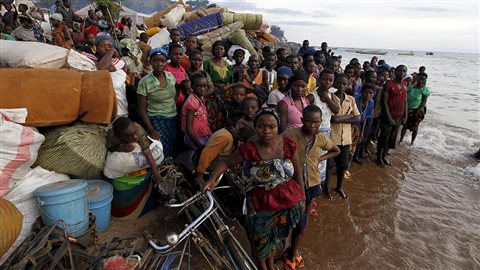Burundian Montrealers held a march last weekend in support of the girls and women taken to Saudi Arabia and Oman to work as housekeepers, usually in deplorable conditions.
The situation for these girls and women, however, in their native Burundi is not much better; kidnapping, torture and sexual violence are employed as a result of President Pierre Nkurunziza’s refusal to honour the Arusha Peace Accord, and step down from his position after two terms. The chaos has resulted in an exodus of nearly a quarter of a million people.
“We’re at a point where the population needs protection”
Patrice Nzigamasabo lives in Montreal now, and recently agreed to become the North American representative for CNARED, a coaliltion of groups and the official opposition movement in Burundi. He says he has never had any political aspirations, but the desperated situation in his native country obliges him to get involved at this time.
Listen
Burundi is a small country in the Great Lakes region of East Africa, bordered by Rwanda to the north, Tanzania to the east and south, and the Democratic Republic of the Congo to the west. It has an extensive shoreline to the southwest along Lake Tanganyika.
The situation is so perilous for those who oppose Nkurunziza. 250,000 people fled the country, when homes were being marked to identify opposition members and death squads would eliminate the family. 1500 people have been killed and 8,000 people jailed.
The President’s youth wing is using sexual violence with reports that 323 girls and women have been gang-raped, according to Human Rights Watch.
That number, according to Patrice Nzigamasabo, is probably only a fraction, as many women will not report the attacks.
Nzigamasabo is eager to find a negotiated solution. But one in keeping with Arusha Peace Accord, where Nkurunziza steps down.
A protest in the capital, Bujumbura, over the weekend brought out 1,000 Nkurunziza supporters, who are condemning the UN decision to send in 228 police officers. Burundi will only accept 50 unarmed UN police officers.
Nzigamasabo says while members of the international community are bringing pressure to bear, the Burundi delegation has walked out of meetings during July with the opposition CNARED, and the African Union.
Nzigmasabo says Burundian-Montrealers, join with the rest of the Burundian diaspora, watching in fear from afar that history is going to repeat itself. Nzigamasabo remembers 1993 when 300,000 people died in Burundi’s civil war. In 1994 the Rawandan genocide took place.
The Canadian government has condemned the actions of President Nkurunziza, and Nzigamasabo, says they are grateful for the support. But now he says it is time for Canada to accept more refugees from Burundi, and to help bring increased pressure on Burundi to accept an African Union force, or a UN force to be allowed in to protect the people. “We’re at a point where the population needs protection” he says, “we’re past that point but anytime the protection can come in it would be welcome.”







For reasons beyond our control, and for an undetermined period of time, our comment section is now closed. However, our social networks remain open to your contributions.